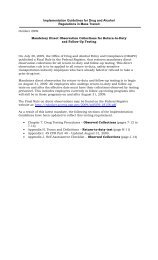FTA Oversight Procedures - Federal Transit Administration - U.S. ...
FTA Oversight Procedures - Federal Transit Administration - U.S. ...
FTA Oversight Procedures - Federal Transit Administration - U.S. ...
Create successful ePaper yourself
Turn your PDF publications into a flip-book with our unique Google optimized e-Paper software.
d) Review the Grantee’s project design documents for clarity, accuracy, and level of detail for a<br />
project at the current phase of project development. Review findings of value engineering and<br />
risk assessments if any have been performed.<br />
2) Evaluate the reliability of the project cost estimate.<br />
a) Review the estimate in its original format and in Standard Cost Category format (SCC)<br />
b) Evaluate the Grantee’s estimating methodology.<br />
c) Verify the “base year” of the estimate.<br />
d) Discuss with Grantee its assumptions regarding escalation of materials and labor.<br />
e) Discuss with Grantee its assumptions regarding inflation over the project life and the level of<br />
associated uncertainty.<br />
f) Evaluate the capital cost estimate in relationship to the scope. Make recommendations where<br />
additional detail or other information is needed.<br />
i) Check the estimate’s internal consistency (does it add up?).<br />
ii) Spot check estimated quantities and unit costs.<br />
iii) Evaluate the reasonableness of escalation for commodities and labor.<br />
iv) Identify sources of uncertainty and related potential for cost increases.<br />
v) Check the adequacy of the allocated contingency for specific line items.<br />
vi) Check the adequacy of the unallocated contingency.<br />
g) Verify the match between the YOE costs and the project schedule.<br />
i) Evaluate the reasonableness of inflation rates used over the project life.<br />
3) Evaluate the completeness, level of detail, and reasonableness of the project schedule.<br />
a) Address the number of activities, logic and logic ties, the critical path, general internal<br />
consistency of the schedule, and the scheduling assumptions adopted by the Grantee.<br />
b) Address durations for each phase of work in relation to the completion of similar work by other<br />
agencies, if known, and the Grantee’s track record for implementing similar projects.<br />
c) Evaluate sources of uncertainly and their likely effects on the schedule should be described.<br />
4) Describe and evaluate the Grantee’s technical capacity and capability to undertake and successfully<br />
complete the project, including its management structure, staff and consultant organization and<br />
experience, professional skills and project experience.<br />
i) Evaluate the Grantee’s project management plan (PMP) for compliance with <strong>FTA</strong><br />
requirements and best management practices. This includes the adequacy of the Grantee’s<br />
strategy to deliver the project within budget and on schedule and with project controls<br />
adequate to design, construct, test and start up a quality system that assures the safety and<br />
security of the riding public.<br />
5) Specifically, at approval to enter into a PCGA, verify that the Grantee has:<br />
a) Updated the PMP through construction and start-up and incorporated risk management.<br />
b) Completed drawings, specifications, and bid documents as required by the project design and<br />
method of procurement.<br />
c) Resolved and received <strong>FTA</strong>’s agreement to right-of-way acquisition and relocation agreements,<br />
and other agreements with third parties such as freight railroads, Amtrak, utility companies, and<br />
other governmental agencies.<br />
OP 45 Small Starts Review<br />
Revision 0, June 2008<br />
Page 4 of 5

















